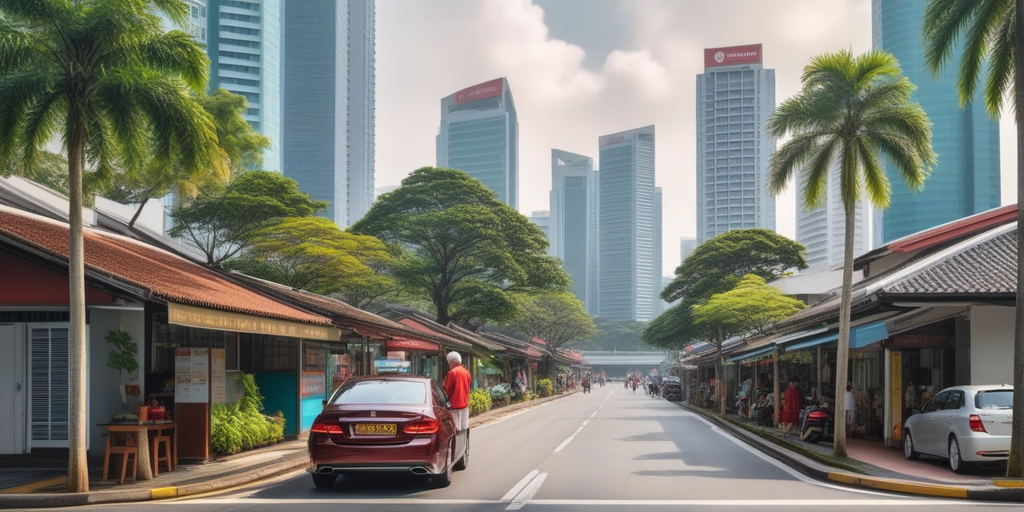How much do you need for retirement in Singapore? It’s a question that many Singaporeans ask themselves as they plan for their future. Retirement can be an exciting time, but it can also be daunting, especially if you’re not sure how much money you’ll need to live comfortably. In this article, we’ll explore the topic of retirement in Singapore, including how much you need to save, financial strategies to consider, and practical considerations to keep in mind.

Understanding retirement in Singapore is an essential first step in planning for your future. Retirement in Singapore typically begins at the age of 62, with the Central Provident Fund (CPF) playing a crucial role in providing retirement income. However, many Singaporeans may need additional savings to supplement their CPF payouts. The amount you need to save for retirement will depend on factors such as your lifestyle, health, and family situation.
Financial strategies for retirement can help you achieve your retirement goals. These strategies may include investing in stocks, bonds, and other assets, as well as diversifying your portfolio to manage risk. It’s also essential to consider inflation and taxes when planning for retirement. By taking a long-term view and seeking professional advice, you can develop a financial plan that meets your retirement needs.
Key Takeaways
- Retirement in Singapore typically begins at the age of 62, with the CPF providing retirement income.
- The amount you need to save for retirement will depend on factors such as your lifestyle, health, and family situation.
- Financial strategies for retirement may include investing in stocks, bonds, and other assets, as well as diversifying your portfolio to manage risk.
Understanding Retirement in Singapore

Retirement is an important and exciting milestone in your life. It is a time when you can finally enjoy the fruits of your labour and pursue your long-term goals. In Singapore, retirement planning is especially important as the cost of living is relatively high. Here are some key considerations to keep in mind when planning for your retirement.
The Role of CPF in Retirement
The Central Provident Fund (CPF) is a key component of retirement planning in Singapore. It is a mandatory savings scheme that helps Singaporeans save for their retirement, healthcare, and housing needs. Your CPF savings can be used to purchase a CPF LIFE plan, which provides you with a monthly payout for life. The amount of CPF LIFE payouts you receive depends on your CPF savings, your CPF Basic Retirement Sum (BRS), and your CPF Special Account (SA) balance.
Retirement Age and Re-employment
In Singapore, the retirement age is currently set at 62 years old. However, you can choose to work beyond the retirement age if you wish to do so. The re-employment age is set at 67 years old, which means that your employer is required to offer you re-employment until you reach this age. This provides you with an opportunity to continue earning an income and building your retirement savings.
Retirement Lifestyle Expectations
When planning for your retirement, it is important to consider your lifestyle expectations. Do you want to travel, pursue hobbies, or spend time with loved ones? These activities can be expensive, so it is important to factor them into your retirement planning. You should also consider your long-term goals, such as purchasing a home or providing for your children’s education.
Healthcare Considerations for Retirees
Healthcare is an important consideration for retirees. As you age, you may require more medical attention, which can be costly. It is important to ensure that you have adequate insurance coverage to protect yourself against medical expenses. You may also want to consider purchasing a whole life insurance policy, which can provide you with coverage for life.
Impact of Inflation on Retirement Funds
Inflation can have a significant impact on your retirement funds. As the cost of living increases, your retirement savings may not be sufficient to cover your expenses. It is important to factor in inflation when planning for your retirement and to ensure that you have enough savings to last you throughout your retirement.
Life Expectancy and Retirement Planning
Life expectancy is an important consideration when planning for your retirement. In Singapore, the average life expectancy is around 83 years old. This means that you may need to plan for a retirement that lasts for 20 years or more. It is important to use a retirement calculator to estimate your retirement needs and to ensure that you have enough savings to last you throughout your retirement.
In summary, retirement planning is an important aspect of your financial planning. By considering the role of CPF in retirement, retirement age and re-employment, retirement lifestyle expectations, healthcare considerations for retirees, the impact of inflation on retirement funds, and life expectancy and retirement planning, you can ensure that you have a comfortable and secure retirement in Singapore.
Financial Strategies for Retirement

When it comes to planning for your retirement, there are several financial strategies that you can employ to help you achieve your retirement goals. Here are some key strategies to consider:
Budgeting for Retirement
Creating a budget for your retirement is an essential first step. Knowing your monthly expenses and how much income you will need to cover those expenses is crucial. According to the Household Expenditure Survey, the average monthly household expenditure in Singapore is around $4,500. However, this will vary depending on your lifestyle and needs. By creating a budget, you can determine how much you need to save to cover your expenses in retirement.
Creating a Sustainable Income Stream
One of the biggest challenges in retirement is creating a sustainable income stream. You can achieve this by building a diversified investment portfolio that generates passive income. This can include dividend-paying stocks, bonds, and real estate investment trusts (REITs). By having a diversified portfolio, you can reduce your risk and ensure that you have a steady stream of income in retirement.
Investing Wisely for Growth
Investing wisely is crucial to achieving your retirement goals. It’s important to have a long-term investment plan that takes into account your risk tolerance and investment goals. The financial market can be volatile, so it’s important to have a diversified portfolio that can weather market fluctuations. You should also consider the returns that you can expect from your investments and adjust your strategy accordingly.
Maximising CPF and Other Funds
CPF savings can be a valuable source of retirement income. By maximising your CPF contributions, you can ensure that you have a steady stream of retirement income. You can also consider other funds, such as the Supplementary Retirement Scheme (SRS), to supplement your retirement income.
Utilising Insurance and Safety Nets
Insurance can be a valuable safety net in retirement. It’s important to have adequate insurance coverage to protect yourself and your family from unexpected events. You should also consider other safety nets, such as the Singapore Deposit Insurance Corporation (SDIC) to protect your savings.
Overall, planning for your retirement requires careful consideration and a long-term strategy. It’s important to seek the advice of a financial adviser to help you achieve your retirement goals. With the right financial strategies in place, you can enjoy a comfortable and secure retirement.
Practical Considerations for Retirement

Retirement is an exciting time, but it requires careful planning to ensure that you have enough funds to cover your expenses. Here are some practical considerations to keep in mind when planning for your retirement in Singapore.
Managing Household Expenditure
One of the most significant expenses in retirement is household expenditure. This includes expenses such as food, utilities, communication, and groceries. To manage your household expenditure, it is essential to create a budget that takes into account all your expenses. You can use a budgeting app or software to help you track your expenses and identify areas where you can cut costs.
Planning for Accommodation and Transport
Another significant expense in retirement is accommodation and transport. If you own a landed property, you may want to consider downsizing to a smaller property or renting out a portion of your property to generate additional income. Alternatively, you could consider moving to a smaller apartment or a retirement community to reduce your expenses.
Transportation costs can also add up quickly, especially if you rely on taxis or private cars. Consider using public transport or carpooling to reduce your transportation costs.
Preparing for Emergencies and Healthcare
Unexpected emergencies and healthcare costs can quickly deplete your retirement savings. It is essential to have an emergency fund that can cover at least six months of your living expenses. You should also consider purchasing health insurance to cover your medical needs.
Understanding Government Schemes and Support
The Singaporean government offers various schemes and support to help retirees manage their expenses. For example, the Supplementary Retirement Scheme (SRS) allows you to save for retirement while enjoying tax benefits. You may also be eligible for government subsidies for your healthcare and housing expenses.
In conclusion, retirement planning requires careful consideration of your expenses and income sources. By managing your household expenditure, planning for accommodation and transport, preparing for emergencies and healthcare, and understanding government schemes and support, you can ensure that you have enough funds to enjoy your retirement in Singapore.
Retirement Milestones and Checkpoints

Planning for retirement can seem like a daunting task, but breaking it down into smaller milestones and checkpoints can make it more manageable. Here are some key areas to focus on when planning for your retirement in Singapore.
Setting Retirement Savings Goals
The first step in retirement planning is setting a savings goal. This can be done using a retirement calculator or by consulting with a financial advisor. Consider factors such as your current age, desired retirement age, life expectancy, and monthly expenses. Keep in mind that inflation and rising costs of living must also be accounted for.
Evaluating Retirement Readiness
Periodically evaluating your retirement readiness is crucial. This can be done by assessing your current retirement savings, projected monthly payouts from CPF LIFE, and any other sources of income. If there is a shortfall, consider increasing your savings rate or exploring other investment options.
Planning for Non-Working Years
Retirement planning should also include planning for non-working years. Consider how you will spend your time, your desired lifestyle, and any potential healthcare needs. It is also important to account for unexpected expenses and emergencies.
Adjusting Plans for Life Changes
Life changes such as marriage, children, and career changes can impact retirement planning. Revisit your retirement savings goals and adjust your plans accordingly. Take advantage of the power of compounding interest by starting early and contributing regularly to your retirement savings.
Overall, retirement planning in Singapore is crucial to ensure financial security in your non-working years. Keep in mind the minimum income standard for retirees in Singapore and adjust your plans accordingly. By setting savings goals, evaluating readiness, planning for non-working years, and adjusting plans for life changes, you can be on track for a comfortable retirement.
Embracing Retirement with Confidence

Retirement is a significant milestone in your life, and it can be an exciting and fulfilling time if you plan and prepare for it. Here are some tips to help you embrace retirement with confidence.
Cultivating a Positive Retirement Mindset
Retirement is an opportunity to enjoy the fruits of your labour and explore new opportunities. Cultivate a positive mindset by focusing on the things you can do rather than what you cannot do. Create a bucket list of things you want to achieve and start ticking them off. You can also find joy in simple things like spending time with loved ones, pursuing a hobby, or travelling.
Staying Financially Disciplined
Retirement planning is crucial to ensure you have enough savings to support your retirement lifestyle. Start by calculating your monthly expenses and budget accordingly. Consider your household expenditure and plan for unexpected expenses like medical emergencies. Ensure you have enough savings in your retirement account to support your monthly payouts. You can also explore investment opportunities to grow your retirement savings.
Exploring New Opportunities Post-Retirement
Retirement does not mean the end of your working life. You can explore new opportunities like part-time or freelance work to keep yourself occupied and supplement your retirement income. Singapore has a re-employment age of 65, which means you can continue working if you choose to. You can also explore new hobbies or volunteer opportunities to keep yourself engaged and fulfilled.
Building a Support Network
Retirement can be a challenging time, and building a support network is crucial to help you navigate this phase of your life. Reach out to your loved ones, friends, and community for social support. You can also join retirement clubs or groups to meet like-minded individuals and build new friendships. Building a support network can help you stay connected and engaged in your retirement years.
In conclusion, retirement is an exciting phase of your life, and with proper planning and preparation, you can embrace it with confidence. Cultivate a positive mindset, stay financially disciplined, explore new opportunities, and build a support network to make the most of your retirement years.
Frequently Asked Questions

What’s the ideal monthly income for a comfortable retirement in the Lion City?
The ideal monthly income for a comfortable retirement in Singapore varies according to your lifestyle and needs. According to a report by the Lee Kuan Yew School of Public Policy, the baseline amount Singaporean single retirees would need per month for basic needs is S$1,379, while elderly couples need around S$2,351. However, if you want a more comfortable retirement lifestyle, you may need to plan for a higher monthly income.
Can you live the dream retiring at 45 in Singapore, and how much will it take?
Retiring at 45 in Singapore is possible, but it requires careful planning and saving. The amount you need to retire at 45 in Singapore depends on your desired lifestyle, expenses, and retirement goals. A good rule of thumb is to save at least 25 times your annual expenses to retire comfortably.
Ready to crunch numbers? Where can I find a retirement calculator tailored for Singapore?
There are several retirement calculators tailored for Singapore available online. One example is the retirement calculator by SmartWealth. It takes into account your current age, desired retirement age, monthly expenses, and other factors to help you estimate the amount you need to save for retirement.
How does the CPF retirement scheme support Singaporeans’ golden years?
The CPF retirement scheme is a mandatory savings scheme for Singaporeans and Permanent Residents. It consists of three accounts: Ordinary Account (OA), Special Account (SA), and Medisave Account (MA). The CPF retirement scheme provides a safety net for Singaporeans’ golden years by ensuring that they have a basic retirement income, healthcare coverage, and a housing safety net.
Will a stash of $1 million ensure a lavish retirement lifestyle in Singapore?
A stash of $1 million may ensure a comfortable retirement lifestyle in Singapore, but it may not be enough for a lavish retirement lifestyle. The amount you need for a lavish retirement lifestyle depends on your desired lifestyle, expenses, and retirement goals.
Is it possible to retire blissfully in Singapore with a nest egg of 300k?
Retiring blissfully in Singapore with a nest egg of 300k is possible, but it requires careful planning and budgeting. You may need to adjust your lifestyle and expenses to make the most of your retirement savings. It’s important to consult a financial advisor to help you plan for your retirement.

